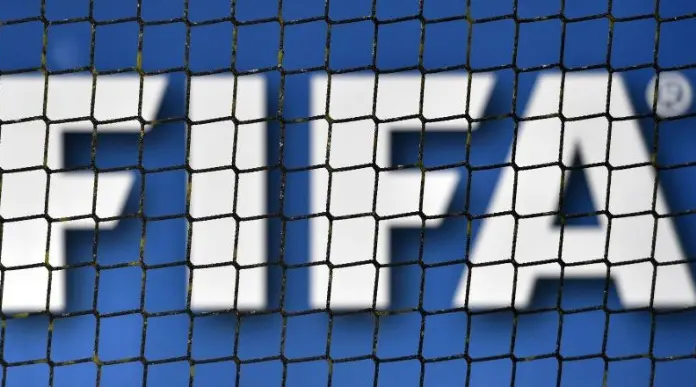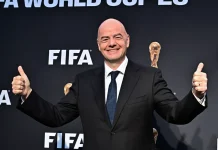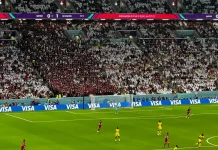The FIFA World Cup, often hailed as a celebration of global unity, competition, and national pride, has become the crown jewel of international sports. Every four years, billions tune in to watch their favorite teams and players compete for the most coveted trophy in football. But beneath the glitz and passion lies a troubling pattern—one that has turned the world’s biggest sporting event into a tool for authoritarian regimes. Increasingly, dictators are using the World Cup not only to boost their international image but also to conceal egregious human rights abuses. In return, they offer FIFA vast sums of money, unchecked access to state-controlled infrastructure, and a willingness to look the other way—creating what critics now call the “World Cup for Sale.”
Authoritarian Regimes: FIFA’s Favorite Hosts?
FIFA’s drive for ever-larger profits and grander tournaments has made authoritarian regimes attractive hosts. While democracies must navigate public scrutiny, environmental concerns, labor protections, and financial transparency, autocracies can operate with near-total impunity. They face little domestic resistance to massive infrastructure spending, often employ forced labor or exploit vulnerable populations, and bypass environmental or safety regulations.
For FIFA, this model is both efficient and lucrative. Autocrats deliver state-of-the-art stadiums, gleaming airports, and elaborate fan zones with impressive speed—often built by multinational corporations that are FIFA partners. According to political analyst Chad Bell, such regimes offer an “ideal environment” for FIFA’s commercial interests to thrive, regardless of the social cost.
Russia, Qatar, and the Whitewashing of Repression
Recent tournaments illustrate this disturbing trend. The 2018 World Cup in Russia was held under the shadow of Vladimir Putin’s increasingly authoritarian rule. Freedom of expression, LGBTQ+ rights, and press freedom were all under siege, but none of this mattered to FIFA. Russia spent over $11 billion on the event, constructing new stadiums and refurbishing infrastructure across 11 cities. The result? A public relations triumph for Putin, who used the tournament to project stability, strength, and modernity to a global audience—despite his government’s documented abuses and international sanctions over Crimea and the war in Ukraine.
Then came the 2022 World Cup in Qatar—a country with no footballing tradition but vast oil wealth. The tournament’s awarding process was mired in allegations of bribery and vote-buying. Qatar faced international outrage over its treatment of migrant workers, with investigations estimating over 6,500 deaths related to World Cup infrastructure projects. These workers, largely from South Asia, labored in scorching heat under harsh conditions with few rights or protections. FIFA remained mostly silent, claiming it was not responsible for domestic labor laws.
Despite the human cost, Qatar was allowed to host the tournament, transforming its global image from an obscure Gulf monarchy to a modern sports hub. The World Cup served not as a celebration of football, but as a stage-managed exercise in authoritarian branding.
Bribery and Corruption in the Bidding Process
FIFA’s role in empowering dictators is not accidental—it is rooted in systemic corruption. Investigations by U.S. and Swiss authorities have revealed widespread bribery in the bidding process for World Cup hosting rights. In 2015, a sweeping U.S. Department of Justice indictment revealed that FIFA executives had accepted hundreds of millions in bribes over several decades.
Russia’s successful 2018 bid allegedly involved secret payments to key FIFA officials. Trinidad and Tobago’s Jack Warner reportedly received $5 million in exchange for his vote for Russia. Qatar’s bid for 2022 involved payments and favors to numerous officials, including secret deals with African and Asian football federations.
These scandals show that hosting rights often go not to the most qualified or ethical nations, but to those willing to pay for influence. FIFA’s decision-making process—opaque, centralized, and shielded from public scrutiny—enables such corruption to thrive.
Historical Precedents of World Cup Propaganda
This is not a recent phenomenon. Dictators have long seen the World Cup as a means to legitimize their rule and distract from repression. In 1934, Benito Mussolini’s fascist Italy hosted the World Cup in Rome. The tournament was tightly controlled by the regime, and there were allegations of match-fixing and referee intimidation. Mussolini used the event to promote fascist ideals and rally nationalist fervor.
In 1978, Argentina’s military junta hosted the World Cup during one of the darkest periods in the country’s history. While the stadiums were packed with cheering fans, just miles away political dissidents were being tortured and “disappeared.” The regime used the World Cup to divert attention from its brutal repression, even as human rights activists tried to sound the alarm.
FIFA turned a blind eye in both instances—and continues to do so in the modern era.
FIFA’s Complicity and Governance Failures
FIFA’s governance structure has played a critical role in enabling this pattern. For decades, the organization operated with little transparency or accountability. Its executive committee—a small group of powerful individuals—made key decisions, including host country selection, without meaningful oversight. Development funds were used as political tools to buy loyalty from member federations, allowing corrupt leaders like Sepp Blatter to remain in power for years.
Calls for reform have grown louder in recent years. Human rights organizations, civil society groups, and even some players have demanded that FIFA implement human rights criteria for host nations, publish transparent bidding procedures, and establish independent oversight. While FIFA has taken some steps, including a new human rights policy adopted in 2017, critics argue that enforcement is weak and cosmetic.
Without structural change, the same corrupt incentives and alliances with authoritarian regimes will persist.
The Real Cost of FIFA’s Silence
The cost of FIFA’s complicity is not just financial—it is measured in human suffering, social injustice, and lost credibility. When FIFA awards its flagship event to authoritarian regimes, it grants them a global stage and legitimizes their rule. The spectacle of the World Cup masks the underlying repression, sending a message that money and power matter more than human rights and fair play.
At the same time, the lives of thousands of exploited workers, silenced activists, and disenfranchised citizens are erased from the narrative. The World Cup becomes less a celebration of football, and more a monument to inequality and impunity.
Reclaiming the Beautiful Game
Football belongs to the world—not to corrupt officials or oppressive regimes. If FIFA wishes to preserve the integrity of the World Cup and honor the sport’s unifying spirit, it must fundamentally reform its governance, bidding process, and human rights standards. This includes banning countries with poor human rights records from hosting, ensuring transparency in all transactions, and holding its own leadership accountable.
Until then, dictators will continue to exploit the World Cup for their own ends—transforming a tournament meant to unite humanity into a stage for authoritarian spectacle. The “World Cup for Sale” must end, and the beautiful game must once again reflect the values it claims to represent: fairness, dignity, and freedom.













